- Home
- Technical Cooperation Projects
- Index of Countries
- Asia
- Indonesia
- Project for Enhancing Drug and Food Safety
- Project News
- Knowledge Co-Creation Programme (country focus - Indonesia) Safety Control System of Food Contact Materials including recycled plastic in Japan
Project News
2019-11-01
Knowledge Co-Creation Programme (country focus - Indonesia) Safety Control System of Food Contact Materials including recycled plastic in Japan
14th - 26th October 2019.
Four officers of Directorate of Processed Food Standardization (SPO), Badan POM participated in the captioned KCCP programme to learn about Japan's regulatory systems and recycling plastics for food contact materials (FCMs).
Programs in Day 1 and Day 3 - Control systems of FCMs.
Japan's regulatory systems of FCM have historically encompassed governmental and private institutions. The MHLW has regulated FCM based on the Food Sanitation Act (enacted in 1948). Its so-called negative list system has been in place to ensure minimum requirements as specified in the standards. Complementary, Japan Hygienic Olefin and Styrene Plastics Association (JHOSPHA) - an industry-driven association found in 1973 has administered its voluntary positive list (PL) system including certification to meet demands of global market for credibility on FCM safety. To effectively ban harmful substances, the MHLW has recently revised the Food Sanitation Act and introduced the official PL system. Full enforcement of the revised Act will start in 2020 and require use of substances only listed and undergone the risk assessment by the Food Safety Commission Japan (FSCJ). It will also enforce GMP operation in industry and information exchange among FCM traders/providers, manufacturers and users to ensure use of only permitted substances in FCM. For the new PL system, the MHLW has given a guidance to industry in 2017 for safety control and management of FCM. FSCJ is ready to apply a coherent risk assessment approach using a guideline published in May 2019 for evaluation of new substances to be permitted in the system. Meanwhile, JHOSPA has continued commitment to implement its own system to prove that only safe and permitted substances are utilized in market.
On Day 3, the participants visited food packaging companies (Mebius, and Toyo-Seikan), and a food manufacture (Kewpie, as a food packaging user) and observed GMP operation in industry. They also learnt how industry prove compliance with both JHOSPHA's private PL system and the public regulation through information exchanges between stakeholders.
Programmes in Day 2, Day 4, Day 5 & Day 6 about recycling plastics for food packaging.
The Act for Promotion of Sorted Collection and Recycling of Containers and Packaging introduced in 1995 clearly defines the role of industry, local governments and, households in terms of 3 R policy (Reduce, Reuse and Recycling) and sustainable recycling systems. And, among others, there are three guidelines being applied to ensure safe manufacturing of recycled plastics including PET for FCM. The MHLW issued the Guideline for recycled FSM in 2012. There was a long process of dialogues between scientists, governments and industry. A study on recycled plastic safety was started in late 1980 and number of data and reports were published. MHLW To learn particularly about PET recycling for PET and safety control. Private industry driven guidelines have been used by industry to self-control of safe recycled plastics for FCM. private guidelines applied by industry. Business entities have developed guidelines for manufacturing and use of PET. PET association guideline PET tray association guideline.
There are major beverage companies, e.g. Suntory, Coca-Cola leading the use of recycled PET for beverages. The recycled PET bottles shall meet not only public regulations, but PET bottle standard mentioned above. Sustainable recycling of PET highly relies on sorting and collection systems of post-consumed PET bottles by local municipalities according to the policy of the recycled Act. To learn earn a integrated comprehensive modules to learn how the whole system works to ensure, the participants visited a local government and looked at waste management facility (Day 5).
The participants also dialogued with a consumer related NGO (Day 4). For sustainable recycling, it is essential to ensure proper management for sorting and collection of wastes from households. PET bottle recycling highly relies on post-consumed bottles collected by local governments enforced by the Recycling Law started in late 1990. In this system, role of local governments for awareness of consumer for household. Since a functional sorting and collecting system in community is indispensable and consumer involvement is a fundamental to have a successful recycling system.
Besides the recycling of PET bottle, the participants visited a food-tray factory (Day 6). The factory has evolved its own market-based collecting system to recycle PET and PS for FCM of food trays. This factory has invested to sustainable PET tray recycling This PET recycling also are based on the recycled PT tray recycling, an industry-driven approach has been successfully implemented following a voluntary standard established by the PET Tray Association (Day 5).
In the end (Day 7), a warp-up session was organized. What was learnt was sum-up and some in-depth dialogues were held through a telecommunicating connection between Jakarta and Tokyo.Relevant officers from Badan POM, JICA Project office and JICA Indonesia office joined the session through Skype.
Food recycled packaging in Japan are regulated by governmental laws and industrial voluntary standards. PET bottles after they were cleaned and separated from caps and labels are sorted and collected by local government, mini markets, and collecting industry. Garbage bins in Japan have been separated by categories: combustibles, incombustibles, can only, PET bottles only, and bottle glass.
In 2001, The Council for PET Bottle Recycling set the rule for recycled bottle to use solely clear bottle bodies (no colouring), to prohibit direct printing on the bottles, and to change to labels easily removable by hands.
First, the "Guideline on the Use of Recycled Plastic Materials in food Apparatus, Containers and Packaging" was enforced by Ministry of Health, Labour and Welfare (MHLW) established on 27th of April 2012 for the purpose of compliance standards and specifications on food contact materials in the Notification no. 370 set out under Articles 16 and 18 of the Food Sanitation Act.
The second guideline was the "Voluntary Design Guidelines for Designated PET bottles" enforced by The Council for PET Bottle Recycling established on 1st of March 2016. It was more stringent than first guideline.
The third one enforced by the Japan PET Tray Association in 2002 and revised in 2015 was the "self-restriction standards" which focused on safety of recycled trays. The PET Tray Association has restricted the use of recycled PET only for indirect food contact in this moment, with an expectation that this restriction would be reviewed in future in view of allowing for direct food contact.
The socialization of waste management in Japan had been carried out more than 20 years since the Act on the Promotion of Sorted Collection and Recycling of Containers and Packaging (referred to as "Containers and Packaging Recycling Act) was established by the Ministry of the Environment in 1997.
Since there was no collecting system for PET bottles in Indonesia, Indonesia could learn the system from Japan. There were so many experiences and knowledge from Japan in the course of the training programme, and these could be used in Indonesia to improve the capacity of NADFC and the system of food contact material control especially in terms of guideline on recycled food packaging. It was noted that a JICA project on environmental policy was ongoing in the Ministry of Environment and Forestry and might address PET recycling policy in terms of environmental sustainability.
Steps to move forward in Indonesia for commencement of waste management system, like Japan, were: to socialize households and students; to collaborate with ministry of environment and other related institutions; and to cooperate with food retailers, e.g. supermarket, and industry.
The session was concluded by Ms Sutanti Siti Namtini (online), Director of Processed Food Standardization, with a closing remark stating her hopes that the cooperation between Indonesia and Japan would continue. In the end, Certificate of Completion was presented to each trainee by name of Shinichi Kitaoka, President of JICA.
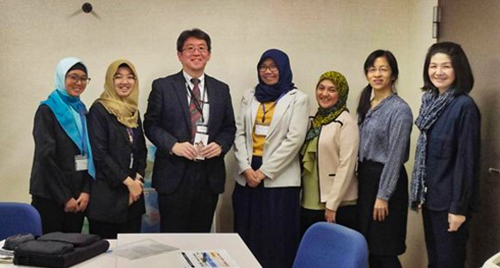 Mr Eiichi Yokota (third from left), Deputy Director in Standard and Evaluation division, MHLW
Mr Eiichi Yokota (third from left), Deputy Director in Standard and Evaluation division, MHLW
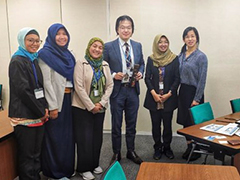 Mr Masahiro Nakamoto (third from right), Technical Official of First Risk Assessment Division, FSCJ
Mr Masahiro Nakamoto (third from right), Technical Official of First Risk Assessment Division, FSCJ
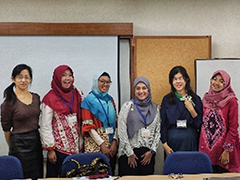 Ms Maki Morita (second from right), President of FOODCOM
Ms Maki Morita (second from right), President of FOODCOM
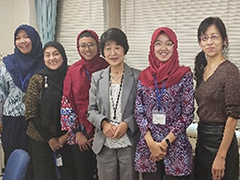 Dr Yoko Kawamura (third from right), Senior Visiting Researcher from NIHS
Dr Yoko Kawamura (third from right), Senior Visiting Researcher from NIHS
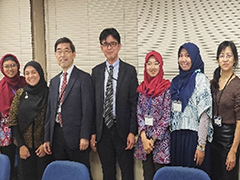 Mr Manabu Tsumori (center) Planning and Policy Director and Mr Haruo Hayashida (third from left), Senior Technical Advisor of JHOSPA
Mr Manabu Tsumori (center) Planning and Policy Director and Mr Haruo Hayashida (third from left), Senior Technical Advisor of JHOSPA
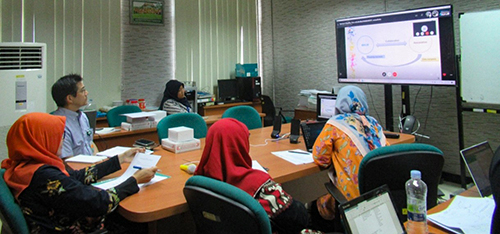 Final Presentation of the participants held both on online at Badan POM Office and offline in Japan
Final Presentation of the participants held both on online at Badan POM Office and offline in Japan
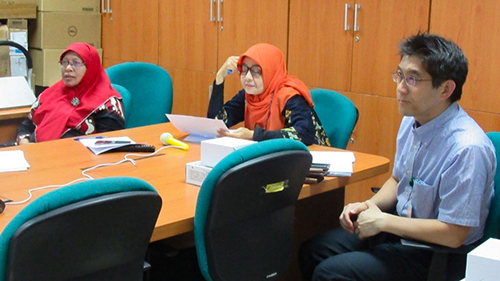 Ms Dra. Sutanti Siti Namtini, Apt., Ph.D (center), Director of Processed Food Standardization, Dra. Deksa Presiana, Apt, M.Kes (left) Head on subdivision of Food Safety Standardization, and Mr Yoshihiko Sano (right), Chief of the Project Office / JICA Expert on Drug Safety.
Ms Dra. Sutanti Siti Namtini, Apt., Ph.D (center), Director of Processed Food Standardization, Dra. Deksa Presiana, Apt, M.Kes (left) Head on subdivision of Food Safety Standardization, and Mr Yoshihiko Sano (right), Chief of the Project Office / JICA Expert on Drug Safety.
- About JICA
- News & Features
- Countries & Regions
- Our Work
- Thematic Issues
- Types of Assistance
- Partnerships with Other Development Partners
- Climate Change / Environmental and Social Considerations
- Evaluations
- Compliance and Anti-corruption
- Science and Technology Cooperation on Global Issues
- Research
- JICA Development Studies Program / JICA Chair
- Support for the Acceptance of Foreign HRs / Multicultural and Inclusive Community
- Publications
- Investor Relations
